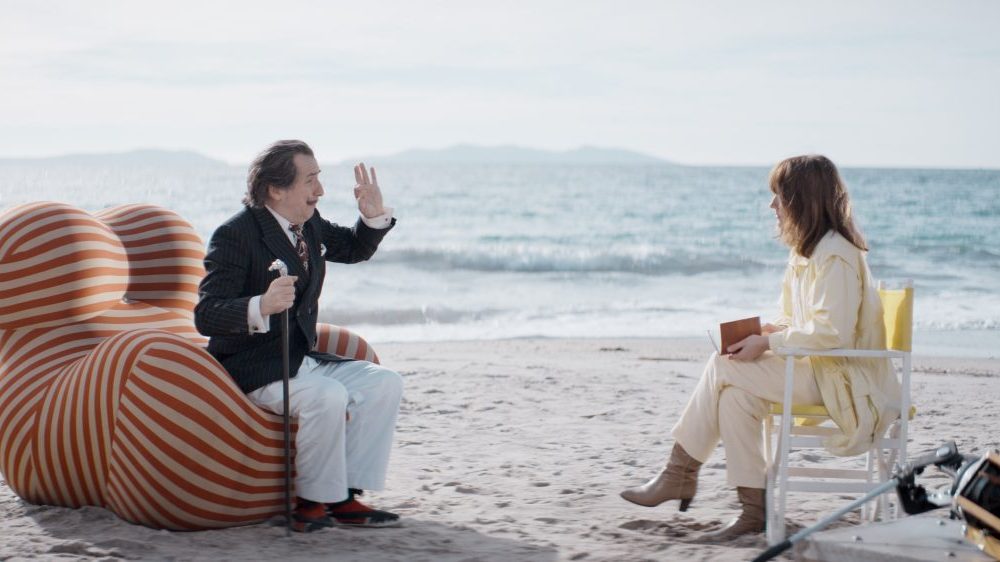
Salvador Dalí is walking down a hotel corridor. A hotel corridor is being walked down by Salvador Dalí. In a hotel, there is a corridor down which Salvador Dalí walks. So begins — and begins and begins – Quentin Dupieux’s giddy, glitchy altogether delightful “Daaaaaali!” (imagine the title delivered by a practiced yodeler in the middle of a morning gargle). It’s the oldest and lo-fi-est of cinematic tricks: a few simple cuts make it seem like a hotel hallway’s finite, solid space is elastic, stretching from the lift doors into carpeted absurdity. Like the film as a whole, the gag gets funnier as it gets sillier, and becomes more of a homage to the surrealist painter’s ability to warp the reality around him, the more drunken its time-loop chronology. “A story should have a beginning, a middle and an end, but not necessarily in that order,” quoth Godard, but “Daaaaaali!” does him one better by having maybe three beginnings, six middles and four or five endings, none of them coming where they’re supposed to, all of them landing in the right place.
At the other end of the untrustworthy hallway, nervous pharmacist-turned-journalist Judith (Anaïs Demoustier) waits for Dalí, who is at this moment played by Édouard Baer, but will at other times be performed by Gilles Lellouche, Jonathan Cohen, Pio Marmaï and Didier Flamand, each different in age and body-shape but the same in mustache and mannerism. Rolling his R’s even where there are none, Dalí’s every word and gesture is that of a magician mid-flourish — although clad impeccably in fur cape and suit, his bearing as erect as the cane he carries and his delivery as stiff as his wax-tipped mustache, there is an irrepressible theatricality to everything he says and does. Eventually conquering the hallway, he settles into an armchair to suffer Judith to interview him, then immediately settles out of it again when he realizes the piece is for print, and not to be filmed. Dalí, like Dupieux, has a profound belief that only the arts “cinématogrrrrrraphique” are equipped to portray his personality, which he regards as his crowning artistic achievement.
Later (though it is also earlier) Judith phones Dalí, interrupting his painting of a scene we’ve already noted, finished, in the background of a prior TV interview. Dupieux’s restaging of some of Dali’s iconography is a witty little bit of business in itself, imagining that he did not simply paint from his mind, but created practical versions of his surreal setups and transcribed them faithfully. So when Judith’s call comes in, a man with an elongated head and another with a handkerchief in his mouth, posing in front of a ruined farmhouse, get to take a break. A pile of rags in the corner suddenly erupts in impatience, a voice from within complaining “This bullshit never ends!”
Judith is asking for a second chance. She has secured the interest of a producer Jerôme (Romain Duris) who is enthusiastic about filming her interview, and promises Dalí “the biggest camera in the world.” This appeals to the man’s monstrous, third-person ego, but when that encounter also falls apart, Judith will try and try again, sometimes getting oh so close, sometimes getting nowhere. Not that we can be sure any of this is happening at all. It could all be part of a dream, recounted to Dalí at a dinner party, by a priest who either shoots or is shot by a cowboy, while the guests, including a stentorian Gala Dalí (Catherine Shaub-Abkarian, stiffly enigmatic beneath high-piled, half-up 1940s hair) enjoy a goat-skull stew teeming with maggots. Dalí hoovers it up with the gusto of one spitting it out played in reverse, because that is exactly what’s happening.
It is fitting, given their frequent collaborations, that “Daaaaaali!” should so amiably mimic the tone and tenor of Luis Buñuel’s surrealist classics, especially in actions that are, like the stew-eating, filmed backwards and played forwards, or that are daisy-chained together under the irresistibly catchy, Spanish-guitar roundelay of Thomas Bangalter’s score. In this discreetly charming way, in the course of a trim 78-minute runtime, Dali finds himself trapped in the quicksands of time unable to escape a dreamscape-type life entirely of his own devising. But Dupieux injects his own particular brand of daffy humor too, writing, directing, shooting and editing his movie, cutting it along a bias that is familiar to those of us who’ve been paying attention to his recent run of form, from “Mandibles” to “Incredible but True” to “Smoking Causes Coughing” to “Yannick,” his excellent 67-minute bottle episode that premiered just last month in Locarno.
But maybe the director’s greatest feat here is that despite the five different actors and all the background nonsense, he makes the beloved, mercurial madman the most consistent presence amid all the other, far more normcore characters. Nobody else seems to notice anything squirrelly going on within the movie’s reality, always accepting the moment they’re in as though that’s the only possible moment. But is Judith a brilliant, driven journalist or a fraudulent naif who should go back to being a pharmacist (or, as Dali insists a boulangère, which means “baker,” though it is somewhat mystifyingly translated to “barista.”) Is Jerôme an endlessly forgiving, deep-pocketed benefactor or a nasty tyrant with an edge of sexism? Does the priest kill the cowboy or does the cowboy kill the priest?
Dalí alone (in conspiracy with the viewer) encounters all these versions of events, and even encounters himself: as a spry mid-life adult he glimpses the creaky elder Dalí in a wheelchair, and rather forlornly begins to suspect that he, the great, impossible genius, like the very least of us, has no control over how time happens to him. Or to put it another way, quoting a bundle of sackcloth of our recent acquaintance, he realizes with frothily comedic bounce and just a soupçon of philosophical depth, that this bullshit never ends.













